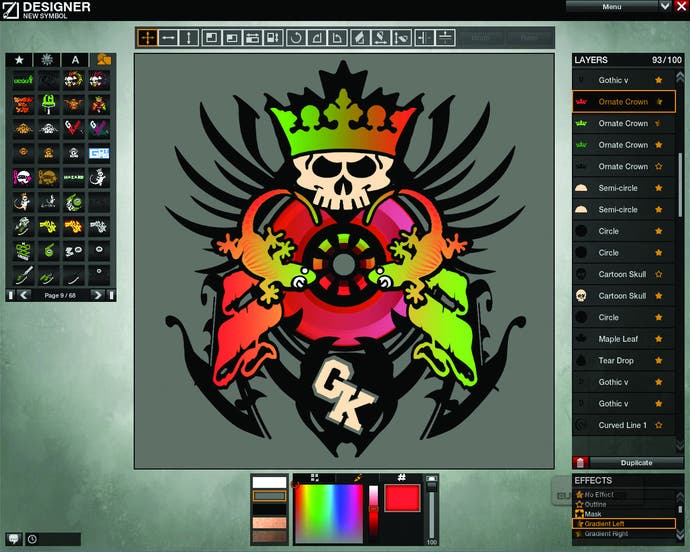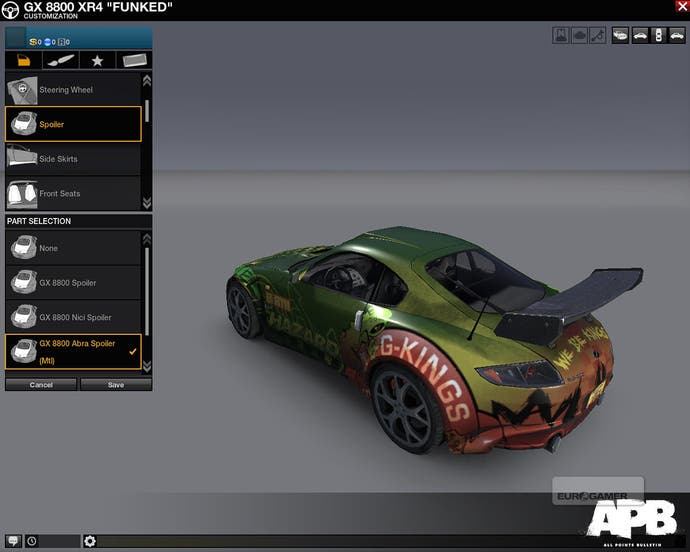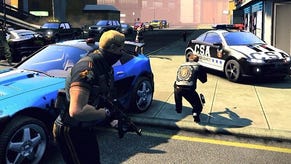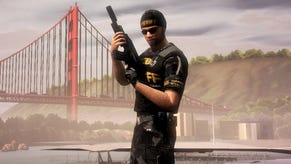APB
Bulletin points.
"The thing that I love about it is, in many MMORPGs your guild has a crafter that's really into the crafting game and you rely on him, but he's really just supplying you with goods that you use," Moreland says. "In ours, these guys are actually driving fashion in the world. Each one of these worlds is going to have its own fashion. [In MMOs it's] time and knowing the system. Here, it's a creative endeavour. That honestly is what hooked me when I came here... I thought, I've got to see what happens."
It's also the only economy we're aware of with marketing mechanics built in. You'll be able to bid on or rent display points in the social district to advertise your wares, or your clan. Other display points for graffiti or items will be free to use on a timed, first-come first-served basis, while others still - statues included - will be earned through climbing up the leaderboards, and will propagate across all the social districts in a world. Player housing and a real estate market is one of Realtime's longer-term plans for APB.
This side of APB - your persistent identity as a player, your social presence away from the tighter focus of the action itself - is not just the definition of a massively multiplayer game, but quite a forward-thinking definition to boot.
"The one catch-phrase that I keep pushing out there is 'persistence is existence', and that's why persistent games are so compelling," Moreland said. "Even the simple, casual persistent games. You actually create an existence in these worlds, and that's your identity there, and it's so important for that to be reinforced with real estate, with statues, with ways to leave your mark in the world."

It's not all about the benjamins, or the threads, however. Gamers do like to define themselves with numbers, and in lieu of the traditional levelling and accumulation of XP, APB offers three different estimations of your worth: Rating, Threat, and Notoriety (for Criminals) or Prestige (for Enforcers).
Rating is the closest thing to a player level, and will only ever go up, with no ceiling; it's a number that reflects how much you've done and how much time you've spent in APB. Threat tracks your performance in the action over a window of time, and is basically an indication of how skilled a player you are - roughly equivalent to a TrueSkill ranking, say. It will serve as a point of pride as well as a matchmaking tool for the game's dynamic mission system, which delights in pitching small numbers of high-Threat players against larger gangs with a lower Threat.
Finally, Notoriety and Prestige will apply only in a single session and scale up to five, similar to the Wanted rating in the popular free-roaming crime series we shall not speak of. They're an indiciation of how much attention you've drawn to yourself, and have consequences - hit a Notoriety or Prestige rating of five, and the entire opposing faction in your district will be alerted to hunt you down.

It's at this point that we should probably return to the mean streets of San Paro to explain how all this translates into gameplay. In a Financial district populated by some 40 or 50 Realtime staff and beta testers - which feels plenty busy enough - I'm matched up with an experienced Enforcer team and sent on patrol.
Although we begin with the familiar trappings of accepting a mission from a contact, buying weapons from a vendor and equipping them, there is no AI to fight, no player-versus-environment content to work through. Also, in a standard ruleset like this, you can't just attack anyone; unless I've been matched against a Criminal team, or come across someone with maximum Notoriety, other players' names are greyed out and I can't harm them.






